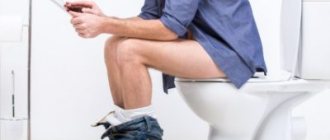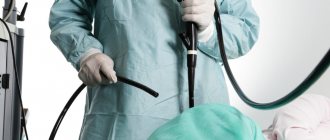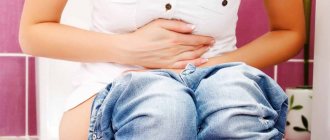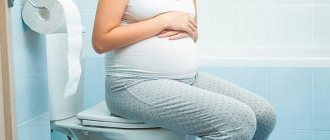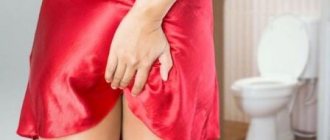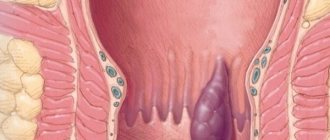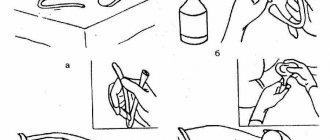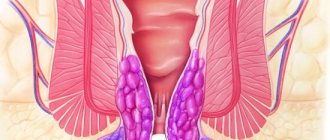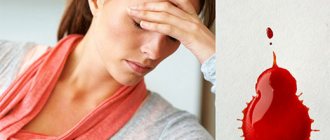Hemorrhoids and constipation often coexist with each other. With hemorrhoids, stagnation of venous blood occurs, which leads to the formation of lumps, which sometimes block the anus and complicate the process of defecation.
A person begins to be afraid to go to the toilet, so he tries to do it less often. And the process gets even worse.
Constant constipation causes the progression of hemorrhoids, so it is imperative to combat the problem.
Causes and symptoms
| Constipation symptoms | Diagnostics |
| Decreased frequency of bowel movements, severe straining during bowel movements, frequent urge to defecate, feeling of incomplete bowel movement, liquid feces. | Palpation of the abdomen, medical history, rectal digital examination, blood and stool tests to detect occult blood, colonoscopy, sigmoidoscopy, etc. |
Impaired bowel movement causes constipation.
There can be many reasons for this:
- stress, depression;
- failure of the endocrine system;
- taking medications;
- sedentary lifestyle;
- impaired blood circulation in the intestinal walls;
- diseases of the rectum and gastrointestinal tract;
- pathologies of the anorectal region.
The onset of an unpleasant process can be triggered by:
• Frequent consumption of bakery products; • Lack of liquid, fiber and greens in food; • Daily consumption of fatty meat and sausage products; • Alcohol abuse.
By eliminating the main cause of the disease, you can count on a positive result.
Only by finding out the true cause of the pathology can you cope with it and exclude the development of inflammation of the hemorrhoidal plexuses and nodes. Internal hemorrhoids, which appear after constipation, are a common manifestation that requires immediate treatment.
How to go to the toilet if you can’t?
How to ease bowel movements with medications
To begin with, you should remember that treatment of any disease with the help of drugs must be accompanied by a balanced diet, moderate physical activity and the absence of bad habits.
Otherwise, the efforts made will only give a short-term effect. How to get rid of constipation and what methods are best to combat the disease? Today there are many drugs in different forms of release:
- decoctions;
- ointments;
- tinctures;
- candles;
- pills.
Some people praise traditional medicine, while others are adherents of pharmaceutical products. In case of acute hemorrhoids, urgent medical attention is necessary, since ordinary decoctions are not able to quickly cope with the disease. The effectiveness of each drug is determined individually, depending on the stage of the disease, the body’s response to the drug and the presence of side effects.
Constipation remedy Duphalac
In the pharmacy you can find the following well-known remedies:
- Carrying drugs. There are quite a few of them, so it is appropriate to consult a doctor or pharmacist to select the most effective one in each specific case. Duphalac is very popular.
- Herbal infusions for weight loss. They are usually packaged in bags, which are convenient to brew instead of tea. You should avoid significant amounts of senna herb, the effect of which has an adverse effect on the condition of hemorrhoidal veins.
- Castor oil. An inexpensive remedy, known since ancient times. If a person is worried about how to go to the toilet, it is worth using just one tablespoon of this drug. Just take into account the fact that defecation can occur after a few hours, so it is better to stay at home for a while.
- Anal suppositories based on glycerin. In addition to helping a person defecate faster, they also have healing properties and protect the mucous membranes from excessive irritation. Treating constipation with suppositories is very convenient; they are completely safe and are often used even for small children.
Do not forget about using enemas with special warm oils. They pull stagnant feces onto themselves and thereby help cure chronic difficulties during bowel movements. Probably every home has a rubber bulb with a small spout. You need to take oil (sunflower or olive), heat it to 37–38 °C and then put it into the enema. How to get rid of constipation, what position is best for the patient to take? It is necessary to lie down so that the oil does not flow out of the anus, but lingers there longer. At this time, irritated areas are lubricated, inflammation is eliminated, and sharp pieces of feces are removed. The answer to the question: how to treat constipation at home? – an oil enema will be used.
Our readers recommend
To treat and prevent HEMORRHOIDS, our readers successfully use a natural remedy designed specifically for home use, without injections, surgeries or other painful procedures. This remedy quickly and effectively eliminates bleeding, eliminates itching, prevents pathologies during pregnancy, and most importantly prevents the return of HEMORRHOIDS! Read more…
How the process works
Before food enters the stomach, it is thoroughly chewed and softened with saliva. Once in the stomach, food is treated with hydrochloric acid and pepsin. Next, it enters the duodenum, where the process of digestion occurs. In this case, bile and digestive enzymes are added to it.
The food then passes into the small intestine where the broken down vitamins, minerals and nutrients are absorbed. The lump, losing nutrients, goes to the large intestine. This is where stool forms. The latter contain powerful poisons, microbes, fats and cholesterol.
Feces should remain in the intestines for no more than 8 hours. If it is delayed for a long time, the reverse process of absorption of toxic substances occurs. In addition, the intestines begin to deform and may rupture. In such cases, intestinal volvulus and severe toxic poisoning most often occur.
Constipation as a cause of hemorrhoids development
It is known that the cause of the formation of hemorrhoids is impaired venous outflow due to loss of vascular tone, stagnation of blood in the rectum, mechanical obstruction and compression. One option is to overfill the lower intestines with feces, drying it out until dense stones form.
Feces are insoluble waste substances that remain in the body after biochemical transformations. Normal digestion absorbs water, beneficial components, and salts from the intestines. The accumulation and increase in the content of indole and skatole acts as a poison and leads to poisoning.
Movement through the intestines is ensured by wave-like contractions of circular and longitudinal muscle groups. They are influenced by:
- irritation of the nerve endings of the walls with internal contents;
- amount of mucus;
- balance of intestinal microorganisms;
- sufficient water supply.
The intestines begin to empty under the influence of impulses from the brain and spinal cord.
Some of the reasons for subsequent hemorrhoids are created by people themselves. These include:
- the lack of sufficient motor mode precludes massaging the intestines with the abdominal muscles when walking;
- unhealthy diet - passion for fast food, dry food, long breaks, overeating, drinking alcohol, frequent barbecue, spicy dishes, unbalanced fashionable diets for weight loss;
- stressful situations, overload at work, inadequate rest.
Other factors for hemorrhoids and constipation are:
- diseases of the stomach and intestines that interfere with the transportation of feces;
- pathology of cerebral circulation, consequences of spinal cord injuries;
- hormonal relaxing effect of progesterone during pregnancy.
Based on the predominant cause, constipation is divided into the following types:
- situational - after stress;
- hypokinetic - with insufficient physical work of the muscles;
- nutritional - if the food contains little fiber from vegetables, fruits, or lack of water;
- mechanical - when obstacles form in the intestines (adhesive disease, tumors, polypous growths, postoperative scars);
- reflex - caused by another pathology of the gastrointestinal tract;
- endocrine - in women during pregnancy, during menopause, in men with diabetes;
- toxic - in case of poisoning with salts of heavy metals, nicotine, and certain medications;
- neurogenic - caused by the consequences of previous injuries, brain diseases.
Constipation with hemorrhoids, in addition to the symptoms of the disease, every time you go to the toilet (pain in the anus, itching of the skin of the anus, bleeding) is accompanied by:
- bloating (flatulence);
- dull pain in the left half of the abdominal cavity, turning into colic;
- nausea, heartburn;
- complaints of weakness;
- irritability and insomnia.
Sometimes the temperature rises. The condition is caused by fecal intoxication of the body, untimely removal of toxins. Signs disappear after successful bowel movement.
Necessary treatment
Effective treatment of constipation due to hemorrhoids involves improving the functioning of the digestive tract.
Problems with bowel movements can be eliminated through diet and increased physical activity. If these measures are not effective enough, the doctor prescribes laxatives and enemas.
Table: Constipation medications
| Symptoms | Medications |
| Difficulty defecating | Psyllium seeds, lactulose, sorbitol, bisacodyl, sodium picosulfate, senna, aloe, domperidone, duphalac, metoclopramide, hyoscine butyl bromide, |
| Constipation and pain | mebeverine, drotaverine, otilonium bromide, papaverine, pinaveria bromide, peppermint oil |
| Bloating | simethicone, diosmectite |
| Complex of all symptoms | paroxetine, glycerin suppositories |
Each organism reacts individually to any changes. For some, a diet is enough to improve daily bowel movements, while others cannot cope with the problem without an enema and medication. Eating enough dietary fiber and fluids helps many people.
Conservative treatment is carried out under the supervision of a doctor for six months.
If no positive changes occur during this time, then surgical intervention is often inevitable. In this case, part or all of the colon is removed.
Recommendations for the use of laxatives
General rules for the use of drugs:
- Before use, consultation with a proctologist and gastroenterologist is required.
- It is better to take before bedtime with an adequate amount of liquid.
- For emergency bowel cleansing, it is recommended to use rectal preparations with herbal ingredients.
- After 2 weeks of therapy there must be a break.
- Contraindications for use are: intestinal obstruction, acute gastrointestinal diseases, acute hemorrhoids.
Signs of constipation
Normally, a person should go to the toilet every day. If this does not happen, we are talking about violations.
You should pay attention to the nature of the stool, as it can tell a lot of things. If bowel movements occur in small portions or with hard stool, you should soften the stool.
Hard stool causes constipation, intestinal damage and the progression of hemorrhoids.
With constant straining, patients are faced not only with hemorrhoids, but also with anal fissures.
Constipation symptoms:
- Problems with bowel movements.
- The need for constant tension in the abdominal muscles.
- Feeling lethargic and tired.
- General intoxication of the body with decay products.
- Flatulence and bloating.
- Lower abdominal pain.
With such symptoms, it is necessary to urgently take action so as not to worsen the problem. It is necessary to understand why this condition occurs so that the pathology does not become chronic.
Proper nutrition
How to get rid of the problem naturally? Proper nutrition for hemorrhoidal disease and constipation is the key to quickly eliminating the pathology.
It is better to eat food in small portions
The list of foods that improve digestion and promote daily bowel movements is quite wide. It includes raw vegetables and fresh fruits. Preference is given to cereals rich in dietary fiber. This includes bran and wholemeal bread, soybeans, carrots, cabbage, zucchini, cucumbers, beets, peas, lentils, dried fruits, nuts and much more. All these products contain large quantities of plant fiber. It is not digested, but increases the volume of feces.
Another group of products helps to increase the secretion of the digestive glands, stimulating fermentation. All this improves intestinal motility. The list of these products is also quite large: beet and cane sugar, natural honey, dried apricots, prunes, grapes, pumpkin, melon, gooseberries, blueberries, plums, apples and more.
How to eat right to avoid constipation and hemorrhoids
Prevention
The most important condition for successful treatment of constipation is high-quality preventive measures.
Prevention:
- Proper nutrition and a diet with plenty of fiber.
- Active lifestyle.
- Drinking enough liquid.
- Timely treatment of all diseases.
Diet and nutrition
You need to include more fiber-rich foods in your diet. These include vegetables and fruits, except potatoes and bananas.
Butter baked goods are replaced with products made from wholemeal flour, and the amount of sugar in the diet is reduced to a minimum.
Excellent results are obtained by eating prunes, raisins and dried apricots, which can be added to cottage cheese or baked goods. Also, based on these dried fruits, a nutritional mixture with a mild laxative effect is made.
If for some reason a person cannot consume enough fiber, he can introduce bran into his diet. They can be soaked overnight and then added to porridge or kefir.
When the taste of this product seems too repulsive, you can add vanilla, cinnamon and other spices to it. Some diets even have a large number of dessert recipes that are made from oat or wheat bran.
Water helps soften stool, so problems with bowel cleansing occur less frequently. When consuming fiber, be sure to drink at least 2-3 liters of clean water per day.
Exercises
Adding moderate physical activity helps to avoid congestion in the pelvic organs. It is better to start with basic exercises or a light warm-up, and only then move on to walking long distances.
If a person wants to get rid of constipation and lose weight, you can exercise on an elliptical trainer.
It is recommended to visit a specialist if any discomfort or pain occurs, and not to postpone the visit until serious problems arise.
Anna: “For a long time I didn’t know how to go to the toilet normally. Constant tension, pain since childhood. Eating beets helped a little, but the effect was short-lived. And only adding physical activity and constantly consuming bran in the diet helped completely solve the delicate problem.”
Vladimir: “I haven’t been able to go to the toilet without problems for a long time now. Chronic constipation became my friends. Only after surgery to remove the appendix was the problem solved. However, I still use prunes and dried apricots in small courses as a preventive measure.”
Sveta: “For a long time I was afraid to go to the toilet, which led to worsening hemorrhoids and frequent constipation. The problem was solved together with a proctologist, who selected effective suppositories and an excellent laxative.”
Useful folk recipes
To get rid of constipation at home, you can use proven folk recipes. Steamed dried fruits have laxative properties: figs, prunes, apricots, dried apricots.
You can use the following recipe:
- Grind 250 g of dried fruit mixture in a blender or pass through a meat grinder. Mix the finished mass with 10 g of crushed dried senna leaves and 250 g of natural honey. A couple of tablespoons of the product, eaten before bed, will provide morning stool.
People suffering from chronic constipation are advised to enrich their diet with foods rich in organic acids. Yogurt, curdled milk, bifidoc, kefir, pickled vegetables and kvass normalize intestinal motility.
Products containing fatty acids can also normalize intestinal function, as they facilitate the passage of feces through the intestines. This includes nuts, cod liver, fish oil or fatty fish, spices, and vegetable oils.
Dishes prepared with gelatin or agar-agar help increase stool mass and improve its movement through the intestines. People with bad bowel movements should definitely fall in love with mousses, jellies, marshmallows, and jellied dishes.
Treatment with folk remedies in the form of tea, decoctions, tinctures is best discussed with your doctor.
How to treat?
If you don't know what to do for constipation, you should explore different ways to treat your intestines.
The following methods and means are used for treatment:
- Laxatives.
- Rectal suppositories.
- Cream and special ointments.
- Enemas.
- Massage.
- Folk remedies and home recipes.
Massage helps only in the early stages, so it is usually combined with other methods of influence.
To improve the condition, just drink a teaspoon of oil, which will give quick results. For severe constipation, castor oil is chosen as an emergency measure, which works within a few hours.
There is an effective enema recipe with oil, which is heated to 38 degrees and injected into the anus. This technique allows you to induce emptying within a few minutes, and it can be used by both adults and children.
When you are worried about constipation with hemorrhoids, lubricating the anus with oil helps a lot.
Rectal suppositories have a similar effect, among which glycerin suppositories stand out. They have a mild effect, so they can be used even by children.
Special ointments help with external hemorrhoids, as they improve the general condition. They relieve inflammation, reduce the size of cones, which facilitates bowel cleansing.
However, laxatives are more in demand, the abundance of which causes confusion.
Laxatives
- Duphalac is a long-acting lactulose syrup that can be taken until the problem is completely eliminated.
- Regulax is a popular German drug characterized by a mild effect. Because of this feature, it is taken at night so that after 10 hours it gives the desired effect. Its use is allowed for hemorrhoids and anal fissures, but children under 4 years of age and pregnancy are serious contraindications.
- Bisacodyl in the form of a suppository helps relieve constipation within an hour. For acute hemorrhoids, cystitis and in childhood, this remedy cannot be used.
- Mukofalk is an original product based on plantain husks. It is ideal for people who consume small amounts of food per day. Plant fiber softens stool and increases its volume. The action of this product is similar to the work of bran and other types of fiber. Thanks to its natural composition, it has a minimum number of contraindications: individual intolerance, age under 12 years, intestinal obstruction.
In the photo: the most popular drugs for constipation
Long-term treatment at home with laxative medications can worsen the problem. “Lazy bowel” syndrome develops, when a person can no longer empty his bowel movements on his own without the help of medications.
Before using any medications or treatment regimens for constipation, you should visit a specialist and get qualified advice.
In some cases, urgent surgical intervention is required, and self-administration of medications significantly increases the duration of treatment.
What is locked up during the development of pathology?
When compiling your daily diet, you need to carefully familiarize yourself with the properties of the products.
You need to exclude foods that inhibit intestinal motility from your menu! These are pasta, jelly, mashed potatoes, semolina, rice and millet porridge. When treating constipation, doctors recommend completely abstaining from alcohol and eliminating white bread from your diet. Dishes should be boiled, baked, stewed, steamed. You should drink at least 2 liters of water during the day. If there are no contraindications, then you can drink a glass of carbonated mineral water twice a day on an empty stomach. Such types of mineral water as “Borjomi”, “Slavyanovskaya”, “Essentuki No. 17” are suitable.
Main symptoms of the disease
In the first stages, hemorrhoids may not manifest themselves at all. Some people feel mild discomfort in the anal area. Further, with greater stretching of the veins, constipation begins to bother. Stool retention complicates the disease. The patient experiences pain and itching. Bleeding that occurs after defecation can cause anemia. Pale skin, dizziness and fatigue are indirect symptoms of varicose veins.
It is impossible to detect internal nodes on your own. A person can only assume their presence. But external hemorrhoids are easy to identify. One or more blue-red balls from the veins form in the anus, which are very painful when palpated.
Therapeutic diet
Treatment of the pathology involves mandatory abstinence from food. A therapeutic diet for constipation and hemorrhoids normalizes daily bowel movements, which promotes rapid recovery. The diet menu is designed in such a way that it contains a large number of foods rich in plant fiber.
Acute pain in the anal area and difficulty defecating cause patients to have a lot of questions about creating their menu.
The principles of dietary nutrition are quite simple:
- The diet must certainly include porridge made from whole grains, as well as raw vegetables and fruits. These products make the intestines soft and smooth.
- To adjust the intestines to a certain rhythm of work, you should eat in small portions. Eat food every 3 hours, at the same time. This regimen will help relieve constipation and prevent the development of hemorrhoids.
- Patients with acute pathology, as well as after operations, are not recommended to include wheat bran in their menu. During this period they are contraindicated.
- Dried fruits contain a large amount of soft plant fiber. They improve intestinal function. But they should be eaten steamed.
What can cause a lack of timely bowel movements?
In combination with bad habits and chronic stress, a mild form of the disease can transform into acute hemorrhoids. Some medications reduce intestinal motility, lead to dehydration, and cause dry mouth and mucous membranes.
A sedentary lifestyle provokes the development of constipation and hemorrhoids
Factors that provoke constipation in hemorrhoids include:
- Sedentary lifestyle. Modern people spend more time in offices than on the street. It is much more convenient for us to travel in comfortable transport than to walk half an hour to work. Many professions involve sedentary activities (accountants, programmers, drivers). Constipation with hemorrhoids occurs due to significant dilation of blood vessels, accompanied by swelling of the soft tissues. The venous walls weaken, the circulatory plexus loses its elasticity and falls out of the rectum. What to do if you need to sit for long periods of time? To avoid blood stagnation in the pelvis, it is recommended to walk for at least an hour every day.
- Burdened heredity. This does not mean passing on any infections or defective genes from parents. The cause of constipation can be congenital weakness of the walls of the veins and their valves, as well as other structural features of the body, including overly sensitive mucous membranes that suffer from any mechanical damage. You should not worry about constipation ahead of time, since maintaining a healthy lifestyle and moderate physical activity will help prevent the disease in a timely manner.
- Unbalanced diet. To accustom the body to periodic bowel movements, it is worth defecating at the same time, for example, in the morning. For people who want to get rid of constipation due to hemorrhoids, doctors advise: eat more often, but in small portions; have breakfast, lunch and dinner according to a clear schedule; eat foods that enhance peristalsis (beets); There is a first course every day.
- Reduction of fluid in the body. It is necessary to drink enough water. It is necessary to maintain the normal consistency of stool, because solid masses can injure the rectum, stretch it and cause constipation in hemorrhoids. Discomfort during bowel movements leads to the appearance of painful cracks, blood in the stool and fear of going to the toilet.
- People belonging to risk categories. First of all, these are pregnant women who are exposed to pressure from the developing fetus on the wall of the rectum. They need to carefully monitor the number of times they go to the toilet and how they feel during bowel movements. Could the cause of difficulty in defecation be due to heavy physical work? This happens quite often, since heavy lifting has an adverse effect on the condition of the pelvis.
Cycling is an excellent prevention of constipation and hemorrhoids.
Long-term use of antibiotics destroys the body's natural microflora, and hormonal medications can give various side effects depending on the characteristics of the body. Therefore, before self-medicating, it is better to visit an experienced proctologist.
Constipation after surgery
Flatulence in the intestines after surgery is common.
Many people face the problem of defecation after undergoing surgery to remove hemorrhoids. It is necessary to get rid of this pathological condition competently and in a timely manner. To do this, you must definitely explain the essence of the problem to your doctor.
Defecation after hemorrhoid surgery is normalized with the help of:
- Use of laxatives. Rectal suppositories and tonics are used.
- The use of microenemas, oil or prepared from decoctions of medicinal plants.
- Compliance with the principles of a therapeutic diet.
- Performing special gymnastics to strengthen the pelvic floor muscles. You should do the exercises 2-3 times a day.
- Drinking enough liquid.
- Daily long walks.
Restrictions for pregnant women with constipation
Physiotherapy of the disease - electrophoresis with Novocaine solution, inductothermy, electrical stimulation are contraindicated for pregnant women. Diadynamic currents, sinusoidal modulated currents, used for heaviness of the stomach, are not allowed for pregnant girls. They negatively affect the pregnant child and sensitize the body to irritants.
You should not take a laxative for hemorrhoids while in position due to the risk of interruption. Strong agents - magnesium sulfate or Carlsbad salt, and less strong ones - rhubarb, senna leaves, buckthorn bark are prohibited. Limit yourself to fiber-rich foods.
Abdominal massage
To establish natural bowel movements, sometimes a special abdominal massage is required. This procedure removes all difficulties in defecation. This massage can be done independently, without the involvement of a specialist.
During the procedure, you need to perform stroking, vibration shocks, and light tapping around the navel. The abdominal massage takes 10 minutes. You need to do 2-3 procedures a day. This massage is contraindicated for patients who have undergone appendectomy, surgery to eliminate hemorrhoids or hernia.
What are hemorrhoids?
Intestinal hemorrhoids are called varicose, inflamed or thrombosed veins. They can be located inside the rectum, on the anal sphincter, or outside. Often people do not notice the disease at an early stage, and this is when there is a chance to eliminate it completely without resorting to surgical interventions.
Hemorrhoids inevitably cause a disruption in quality of life. A person experiences pain, itching, burning in the sphincter area. Also, in patients, the digestion process is disrupted, stool retention occurs, performance decreases, depression, isolation, and complexes occur.
Consequences in the body
The consequences of chronic constipation are always disastrous. A person experiences a feeling of bloating and even pain.
Long-term processes of holding back bowel movements can lead to the following complications:
1. Headaches and severe fatigue; 2. Partial decrease in vision; 3. Poor condition of nails, hair and skin; 4. High levels of sugar and cholesterol; 5. Intestinal obstruction; 6. Bowel cancer.
It is better to find out the reason for the absence or impossibility of bowel movements with a doctor. The specialist will prescribe the most effective treatment and give valuable advice for prevention.
What to do if constipation and hemorrhoids begin during pregnancy and after childbirth? Urgently consult a proctologist! Only an experienced doctor can give a remedy that will not affect pregnancy or mother's milk.
Important
Why does constipation occur and progress?
Functional disorders of the intestine begin with small problems: nerve and muscle cells do not receive nutrition adequate to the load, their resource is depleted and some cells die.
If nerve cells are depleted
, then the coordination of contraction of muscle structures is disrupted and the formation of the urge signal is disrupted.
If muscle cells are depleted
, then the movement of intestinal contents slows down.
In both cases, this manifests itself as stool retention, in which the intestinal masses “thicken”. This further increases the load on the intestinal muscles and leads to worsening functional impairment. The circle closes. Therefore, one-time constipation often becomes chronic and leads to complications, such as the development of hemorrhoids.
The first functional delays in stool begin due to a weakening of the “urge” signal. The reason for this is a disruption in the nutrition of the nerve pathways and the receptors themselves. As a result, the urge signal is formed late, the contents accumulate at the outlet and harden. The reasons for the deterioration in the nutrition of nerve cells and receptors are:
- congestion
- compression of the pelvic organs
- compression of the roots in the spine due to swelling or intervertebral hernia
Feces thickened as a result of stagnation cause overload and depletion of the intestinal muscle structures, as well as increased wear and tear of the intestinal mucosa.
Since the intestines “work” all 24 hours, the state of the resources of muscle structures can have negative dynamics, which leads to chronic constipation.
Chronic constipation progresses and laxatives stop working. If comprehensive therapeutic measures are not applied, the weakening of muscle structures gradually spreads to the entire large intestine. The flexures of the large intestine are the first to be affected. In this case, laxatives taken orally, as well as suppositories and enemas administered through the anal canal cannot affect the entire large intestine due to its being clogged with dense masses.
The problem of weakening muscle structures is complicated by the fact that the tone of the muscle structures themselves creates tissue microvibration, which is an important factor in the blood supply for everyone, including the muscle cells themselves.
If muscle exhaustion occurs, then the blood supply to the cells practically stops.
As a result, a vicious circle arises:
To restore muscle structures, microvibration is needed, but there is none, because the muscles are exhausted. Such a vicious circle can only be broken with the help of an external source of microvibration, for example, by the phonation method*.
*Phonation - carrying out physiotherapeutic procedures using vibroacoustic impact devices (VAV)
It is important to know
Despite all the positive aspects of treating hemorrhoids with potassium permanganate, this method has contraindications.
The use of potassium permanganate is prohibited for people with hypersensitive skin, because even a weak solution can cause a chemical burn. The skin around the anus is very delicate; prolapsed nodes with a thin shell of mucous tissue are also highly susceptible to burn processes.
In addition, there are other restrictions and prohibitions for the use of potassium permanganate for treatment:
- The drug cannot be used as a therapeutic agent if there are allergic manifestations to this drug;
- there are no contraindications for the use of potassium permanganate for the treatment of hemorrhoids in pregnant women, but it is best to use lotions, washes and microenemas;
- Cold baths are prohibited for patients with pathologies of the genitourinary system and various inflammations;
- hot baths are contraindicated for patients with thrombosis and strangulated nodes.
For the treatment of hemorrhoids, especially during periods of exacerbation, a solution of potassium permanganate will be a reliable and effective treatment. 5-7 days are enough to get rid of unpleasant symptoms.
In order not to harm yourself or aggravate the disease, first consult with a specialist - only he can determine the need for such treatment.
General tips and tricks
What to do for hemorrhoids with constipation? In the process of getting rid of constipation due to hemorrhoids, proper nutrition plays an important role .
You should include more vegetables, fruits, cottage cheese, and dairy products in your diet. It is better to avoid fatty, fried and spicy foods, as well as strong drinks.
Taking various oils has a laxative effect: flaxseed, pumpkin, sea buckthorn.
Medicinal enemas relieve chronic constipation. Enemas for hemorrhoids with simple boiled water, which cleanse the intestines well, are also effective. If there is increased rectal bleeding, it is better to refuse an enema!
An active lifestyle, sufficient exposure to fresh air, and exercise also help normalize digestion. When working sedentarily, it is recommended to periodically stand up, warm up, and perform simple gymnastic exercises.
Also on our website you will find descriptions and instructions for use of a variety of drugs for hemorrhoids of various forms and spectrum of action.
- Rectal suppositories:
- painkillers: with novocaine, papaverine, belladonna, Anestezol;
- wound healing: with propolis, methyluracil, Natalsid, Prostopin;
- anti-inflammatory: Indomethacin, suppositories against cracks;
- laxatives: with glycerin;
- universal: with heparin, ichthyol, Gepatrombin, Anuzol;
- for prevention: Nigepan.
- Gels: Hepatrombin, Troxerutin, Lyoton.
- Ointments: heparin, Bepanten, methyluracil, zinc, Aurobin, Fleming and Vishnevsky ointment.
Tablets: Venarus, Detralex, Phlebodia.
Rules for defecation
It is advisable for everyone to follow international recommendations on proper bowel movements to prevent hemorrhoids or other proctological diseases. What is their essence:
- You cannot tolerate, suppress the urge and deliberately delay the moment of defecation.
- You need to sit on the toilet so that your knees are higher than your hips; to do this, you can place a small stool under your feet, rest your elbows on your knees, and support your chin with your palms.
- During bowel movements, you need to relax your stomach and straighten your back.
- The act of bowel movement should take place simultaneously without long sessions in the toilet.
If a person has an anal fissure or enlarged nodes in the anal canal, the process may be difficult due to pain. Such people complain: “Going to the toilet feels like torture.” The situation is difficult, but not hopeless, and advice from a specialist can help. How to painlessly go to the toilet with hemorrhoids:
- stick to a schedule - each person has his own biological clock, it is better to accustom the body to morning or evening bowel movements, the norm is to have a bowel movement at least once every 1-2 days;
- review your diet - to prevent constipation, be sure to consume plant-based dietary fiber, cereals, fermented milk products and a sufficient amount of regular drinking water (about 2 liters per day);
- do not turn the toilet into a place for relaxation; the act of defecation should be immediate;
- maintain the correct posture while sitting on the toilet, according to international recommendations of proctologists;
- wash yourself after each trip to the toilet with cool water or use wet wipes for intimate hygiene instead of rough toilet paper;
- change underwear daily;
- to prevent damage to the mucous membrane, you can periodically do counter microenemas with 50 ml of vegetable oil 5-10 minutes before the expected bowel movement or use rectal suppositories (for example, glycerin) in the morning 15-20 minutes before bowel movement;
- if it is impossible to have a painless bowel movement on your own, use safe laxatives to soften stool - Duphalac, Forlax, Normaze, etc.
Recovery period
To minimize complications after surgery, the patient must properly prepare for the operation. In a conversation with the doctor, possible contraindications and risk factors are determined, due to the presence of which complications may arise. Before surgery, bowel cleansing is mandatory. This can be done with an enema or special laxatives designed for complete cleansing.
It is important to follow the recommendations of doctors during the preparatory period. It is necessary to follow the prescribed diet and completely exclude from the diet foods that irritate the intestines.
After surgery, the patient must be under medical supervision. The doctor will tell you what your diet should be during the postoperative period. You should also find out how and with what it is necessary to treat wounds in such a delicate area. Separately, we should discuss when the first bowel movement should occur and how to make the bowel movement process as easy as possible in the first days.
According to operating doctors, patients complain of pain for 2-4 weeks. But if in the first days the pain is quite strong, but after a week it noticeably decreases. In cases where no noticeable relief occurs by the second week, complications may develop. You should definitely see a doctor.
Effect of cold water
Dilated veins are associated with a feeling of pain, tissue swelling, and changes in blood circulation in the pelvis. A treatment such as cool water exhibits effective results due to the direct effect of low temperatures on pathological areas.
Cold has the following healing effect:
- vasoconstrictor - cold helps the anal veins narrow, this does not cause stagnation in the vessels. In addition, it can stop bleeding;
- anesthetic - the drug helps relieve pain, unbearable itching, this occurs due to the fact that low temperatures freeze the nerve endings;
- vascular tonic - cold affects the walls of blood vessels, they become tighter, more elastic, and reach their current tone.
If you treat hemorrhoids with chilled water, you can noticeably reduce the size of the hemorrhoidal lump. When therapy is carried out at the first stage of disease development, the likelihood of absolute disappearance of the nodes increases.
Only cooled boiled water is used as a remedy to eliminate hemorrhoids. Do not use tap liquid to avoid infection through wounds or anal fissures. It is also prohibited to carry out therapy with sea water, salt leads to an increase in the pathological symptoms of hemorrhoids.
However, cold treatment is not able to eliminate hemorrhoids completely; this remedy is used only as an additional method of treatment.

